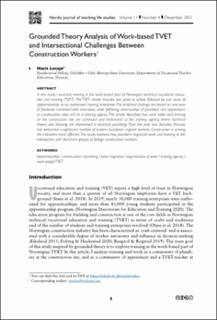Grounded Theory Analysis of Work-based TVET and Intersectional Challenges Between Construction Workers
Peer reviewed, Journal article
Published version
Permanent lenke
https://hdl.handle.net/11250/3054084Utgivelsesdato
2021Metadata
Vis full innførselSamlinger
Originalversjon
Nordic Journal of Working Life Studies. 2021, 11 (4), 3-22. https://doi.org/10.18291/njwls.126103Sammendrag
In this study, I examine training in the work-based part of Norwegian technical vocational education and training (TVET). The TVET model includes two years in school followed by two years of apprenticeship at an authorized training enterprise. The empirical findings are based on one year of fieldwork combined with interviews, while following communities of plumbers and apprentices on construction sites and at a training agency. The article describes how work tasks and training on the construction site are continued and elaborated at the training agency, where technical theory and drawing are intertwined in practical plumbing. Over the past two decades, Norway has welcomed a significant number of eastern European migrant workers. Construction is among the industries most affected. This study explores how plumbers negotiate work and training at the intersection with dominant groups of foreign construction workers.

